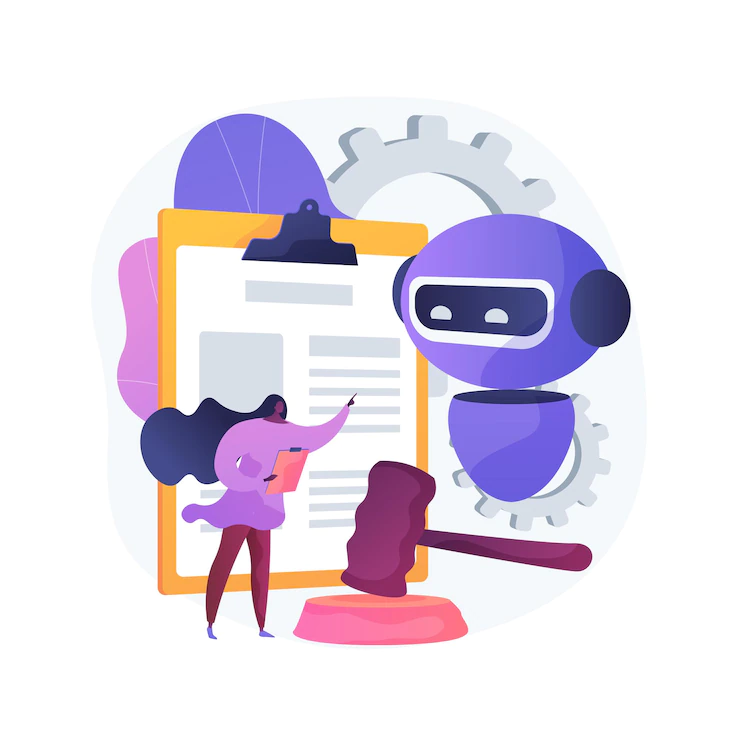Adoption of artificial intelligence (AI) in the legal industry is bound to witness a spike in the coming years. While AI is mainly about training machines to take decisions, it can also enhance the efficiency of select legal processes without undermining the importance of legal professionals. Though still in its nascent stages, AI is all set to transform the legal services sector in several ways in 2022, five of which, we’ve highlighted here.

1. Enhancing the efficiency of due diligence and research
The legal system reportedly generates a few quintillion bytes of data each day, making it arduous for legal professionals to find the details they often require to prepare for a lawsuit. E-discovery and other tools based on Natural Language Processing, smart enough to retrieve meaningful results from legal database, have been in use for a while now.
In addition to facilitating the collection and production of electronically stored information (ESI) to support legal cases, they also have built-in processes to review and analyze the relevance of the collected documents. Lawyers can identify privileged and confidential information in the form of e-mails, chats, image files, electronic documents, databases, and any digital details are available on record within a fraction of the time spent on manual reviews.
Apart from drastically cutting down the time and effort spent on preliminary research, AI-powered solutions also help locate the most relevant pieces of information efficiently.
With more legal professionals now adept at using E-discovery and similar AI-based solutions, they are likely to be widely adopted to meet increasing caseloads.
2. Speeding up documentation and contract management
Litigations, no matter how simple, demand a lot of paperwork. Getting the necessary documents and contracts prepared in the prescribed formats is another task requiring due attention and time. Tools and solutions backed by AI are bound to take the pinch out of preparing legal documents as they are now intelligent enough to draft documents in specific templates based on the requirements and purposes. They learn from human inputs (machine learning, ML ) and continuously evolve with extensive use, getting better with every bit of information they process.
Document generation is expected to be automated wherever there is enough historical data for the software to glean reference information.
3. Forecasting case outcomes
Several AI-powered solutions like Legalmation, tools from Bloomberg Law, and other companies help automate ESI collection, document review and forecast the outcome of a case based on the facts and ESI. Predictive analysis helps lawyers build a strong response or file a lawsuit with a sure chance of winning the litigation by presenting the most relevant pieces of documentary evidence gleaned using AI-based tools. This process is expected to become a norm in future to ensure that the time, effort and money spent on litigations don’t get wasted.
4. Automating transcriptions
Transcription of recorded legal audio and video files is a challenging process. Verbatim transcripts of legal proceedings are an integral part of the paperwork needed for a hearing/litigation.
Given the sheer volume of such recordings that need transcription, AI-powered speech recognition solutions save a lot of time and effort that legal professionals otherwise spend on the task. Automated transcription services are bound to be widely adopted as the need for digital depositions is on the rise. They also prove invaluable in cases where there are no stenographers to interpret court proceedings.
Legal transcribers may, however, need to vet the automated transcripts for accuracy, but automating the process will drastically cut the time to produce transcripts.
5. Enabling access to justice for everyone
Automating legal expertise ensures access to professional guidance, especially for those who can’t afford legal counsel. From contesting parking tickets and disputing an eviction notice to drafting wills, legal advice is available instantly via applications such as DoNotPay. Lawyers can now focus on more lucrative and challenging cases with AI-powered applications offering legal help to sort out common problems.
Conclusion
AI-powered systems and tools can now look for context-sensitive meaningful electronic information thanks to NLP. They can also learn from historical data (loads of it) to improve their intelligence when trained via ML. As they continue to enhance their capabilities and perform repetitive tasks with impressive speeds and accuracies, legal professionals across the hierarchy are bound to save a lot of time and effort. Legal processes are likely to be faster and more accurate with efforts channeled along the right path leading to favorable outcomes.
Legal professionals will have more time to spend on client interactions, case studies and training AI-based legal apps. While their billable hours may plunge, the quality of services is likely to improve, and their client is base bound to expand!



0 Comments